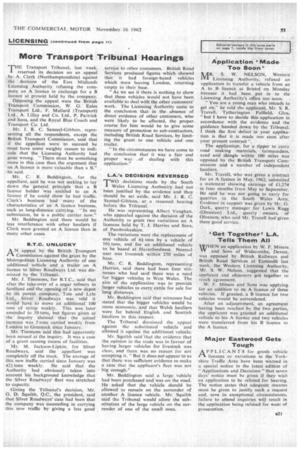More Transport Tribunal Hearings
Page 55

If you've noticed an error in this article please click here to report it so we can fix it.
THE Transport Tribunal, last week, reserved its decision on an appeal by A. Clark (Northamptonshire) against the decision of the East Midlands Licensing Authority refusing the company an A licence in exchange for a B licence at present held by the company.
Opposing the appeal were the British Transport Commission, W. G. Eales Transport Ltd., F. Mallard (Transport) Ltd., A. Lilley and Co. Ltd., P. Partrick and Sons, and the Royal Blue Coach and Transport Co. Ltd.
Mr. J. R. C. Samuel-Gibbon, representing all the respondents, except the British Transport Commission, said that if the appellant were to succeed he must have some weighty reason to indicate that the Licensing Authority had gone wrong. There thust be something more in this case than, the argument that an A licence is more valuable than a B," he said.
Mr. C. R. Beddington, for the appellant, said he was not seeking to lay down the generat principle that a B licence holder was entitled to an A licence if he could show he had traffic. Clark's business had many Of the characteristics of an A licence business, such as long-distance carrying. "In my submission, he is a public carrier now."
Mr. Beddington said there would be less interference with other hauliers if Clark were granted an A licence than in many other cases.
B.T.C. UNLUCKY
AN appeal by the British Transport Commission against the grant by the Metropolitan Licensing Authority of one additional vehicle and a trailer on A licence to Silver Roadways Ltd. was dismissed by the Tribunal.
Mr. J. Timmons, for B.T.C., said that after the take-over of a sugar refinery in Scotland and the opening of a new depot by its, parent company, Tate and Lyle Ltd., Silver Roadways was told it would have to move an additional 100 tons of syrup weekly. This was later amended to 50 tons, but figures given at the inquiry showed that the actual increase was .5 tons carried weekly from London to Greenock since January.
Mr. Timmons said this had apparently been missed at the inquiry. It was a case of a grant causing excess of facilities.
Mr. M. Jackson-Lipkin. for Silver Roadways, said the appellant was completely off the track. The average of this new traffic carried since January was 42 tons weekly. He said that the Authority had obviously taken into account his background knowledge that the Silver Roadways' fleet was stretched to capacity.
Giving the Tribunal's decision, Mr. G. D. Squibb, Q.C.,' the president, said that Silver Roadways' case had been that the company was succeeding in carrying this new traffic by giving a less good
service to other customers. British Road Services produced figures which showed that it had foreign-based vehicles which were leaving London, returning empty to their base.
"As we see it there is nothing to show that .these vehicles would not have been available to deal with the other customers' work. The Licensing Authority came to the conclusion that • in the absence of direct evidence of other ctistomers, who were likely to be affected, the proper. course for him would be to give some measure of protection to sub-contractors, including British Road Services, by limiting the grant to one vehicle and one trailer.
"In the circumstances we have come to the conclusion that it was a fair and proper way „of dealing with this application."
L.A.'s DECISION REVERSED
TWO decisions made by the South Wales Licensing Authority had not been justified by the evidence and they should be set aside, said Mr. J. R. C. Samuel-Gibbon, at a resumed hearing before the Tribunal.
He was representing Albert Vaughan, who appealed against the decision of the Authority to grant two variations on A licences held by T. S. Harries and Sons, of Pembrokeshire.
The variations were the replacement of one vehicle of 6i tons by a vehicle of 104. tons, and for an additional vehicle to be based at Haverfordwest. Normal user was livestock within 250 miles of base.
Mr. C. R. Beddington, representing Harries, said there had been four witnesses who had said there was a need for bigger vehicles in West Wales. The aim of the application was to provide larger vehicles to carry cattle for sale for long distances.
Mr. Beddington said that witnesses had stated that the bigger vehicles would be more economic, and that Welsh hauliers were far behind English and Scottish hauliers in this respect. .
The Tribunal dismissed the appeal against the substituted vehicle and allowed it against the additional vehicle.
Mr. Squibb said that the evidence that the opinion in the trade was in favour of having larger vehicles for livestock was dear, and there was no reason for not accepting it, "But it does not appear to us that there was sufficient evidence to make a case that the applicant's fleet was not big enough."
Mr. Beddington said a large vehicle had been purchased and was on the road. He asked that the vehicle should be allowed to remain on the surrender of another A licence vehicle. Mr. Squibb said the Tribunal would allow the substitution of the large vehicle on the surrender of one of the small ones.








































































































































